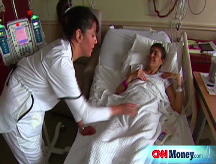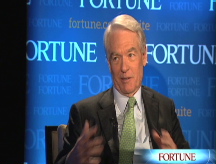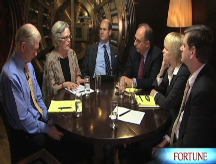Stocks slump on auto bailout worries
Wall Street retreats ahead of Senate vote on the $14 billion auto industry bill.

NEW YORK (CNNMoney.com) -- Stocks slumped Thursday on worries that the $14 billion auto rescue bill won't pass in the Senate due to Republican opposition.
The Dow Jones industrial average (INDU) lost 196 points, or 2.2%. The Standard & Poor's 500 (SPX) index lost 2.9% and the Nasdaq composite (COMP) lost 3.7%.
After the close, Bank of America said it will cut up to 35,000 jobs over the next three years due to its purchase of Merrill Lynch and the weak economy.
Stocks rallied late Tuesday on optimism that Washington would pass an auto industry bailout bill soon. Late Wednesday, the House of Representatives passed the bill and the Senate had been expected to take up the vote Friday.
But debate on Capitol Hill Thursday showed that Republican opposition to the bill in its current state is strong enough to potentially sink the measure. (What's next?)
Lawmakers have been debating ways to help the automakers for over a month. The protracted process of debating, discussing and ultimately creating a bill has kept stocks from moving significantly after the recent advance, said Gary Webb, CEO at Webb Financial Group.
"The delays and the appearance of negative news is bothering the market," Webb said.
"Wall Street is impatient and wants them (Congress) to get it wrapped up soon," he added. "But like with the $700 billion bailout, which took ten days, Congress wants to get it right, not just do it fast."
Should the Senate shoot down the bill in its current form, that would spark a big selloff in the short term, Webb said. However, he doesn't think the market will get much of a boost if Congress passes a bailout because investors are already anticipating that automakers will get assistance.
Experts say the failure of any one of the Big Three could trigger massive job losses and send the U.S. deeper into recession.
Stocks are also struggling after surging in a short period of time. Between Nov. 20, when stocks hit the current bear market low and Monday, the S&P 500 surged 21%. Since then, the stock market has been seesawing.
"We had a large rally in a pretty short period of time and so the market is taking a breather here," said Christopher Colarik, portfolio manager at Glenmede. "We're in a bottoming process, but its still going to take a while."
In the week ended Dec. 10th, investors pulled roughly $2.8 billion out of equity mutual funds, after pulling $12.1 billion out of funds in the previous week. Investors have cashed out of equity mutual funds in 17 of the last 19 weeks.
Automakers: On Wednesday night, the House of Representatives passed the bill 237 to 170, due to strong Democratic support. A minority of Republicans supported the bill, but there's concern that Republican opposition could sink it in the Senate, which votes on Friday.
The $14 billion auto sector bailout is seen as a stopgap measure that will keep GM and Chrysler from filing for bankruptcy - at least through the end of March.
This would give the Obama administration and the new Congress time to come up with a more permanent solution for the ailing automakers.
Ford Motor is also eligible for part of the loan, but the company said it doesn't need the cash right now. Ford just wants access to the money in case it needs a backstop.
Shares of GM (GM, Fortune 500) lost 10.4% and Ford Motor (F, Fortune 500) lost 10.8%.
Economic news: Jobless claims continued to surge, according to a government report released Thursday. The number of Americans filing new claims for unemployment benefits rose to a 26-year high of 573,000, up 58,000 from the previous week and a bigger surge than expected. The number of people continuing to collect unemployment also hit a 26-year high.
Another report showed that the trade gap widened in October, although forecasts were for it to narrow. The widening reflected the recent plunge in U.S. exports as the economy has weakened.
The U.S. has been in a recession since December 2007, according to a National Bureau of Economic Research report released last week. A majority of top-level executives think the recession will last at least another year, according to a survey by Duke University released Wednesday.
Stock movers: Drugmaker Eli Lilly (LLY, Fortune 500) warned that it will post a big loss for 2008 and lower earnings in 2009 due to costs related to its $6.5 billion purchase of ImClone. Shares gained 1.7%.
Consumer products maker Procter & Gamble (PG, Fortune 500) warned that current-quarter sales won't meet its previous forecast due to slower worldwide sales amid the recession. Shares inched lower.
A number of financial services stocks fell in response to the weak economic news and questions about a bailout.
American Express (AXP, Fortune 500), Bank of America (BAC, Fortune 500), Citigroup (C, Fortune 500) and JPMorgan Chase (JPM, Fortune 500) were among the decliners.
Gainers included Alcoa (AA, Fortune 500), Yamana Gold (AUY), Freeport-McMoRan Copper & Gold (FCX, Fortune 500).
Market breadth was mixed. On the New York Stock Exchange, losers beat winners three to one on volume of 1.47 billion shares. On the Nasdaq, decliners beat advancers by five to two on 2.07 billion shares.
Bonds: Treasury prices inched lower, raising the yield on the benchmark 10-year note to 2.70% from 2.68% Wednesday. The 10-year yield dipped below 3% last month for the first time since the note was first issued in 1962. Treasury prices and yields move in opposite directions.
Lending rates improved modestly. The 3-month Libor rate slipped to 2% from 2.1% Wednesday, according to Bloomberg. The overnight Libor held steady at a record low of 0.12%. Libor is a key bank lending rate.
Other markets: In global trading, Asian markets were mixed, with the Japanese Nikkei rising 0.7%. European markets were also mixed, with the London FTSE up 0.5% and the German DAX down 0.8%.
The dollar fell versus the euro and the yen.
U.S. light crude oil for January delivery rose $4.46 to settle at $47.98 a barrel on the New York Mercantile Exchange.
COMEX gold for February delivery jumped $17.80 to settle at $826.60 an ounce.
Gasoline continued its fall to four-year lows, with prices down 1.9 cents to a national average of $1.664 a gallon, according to a survey of credit-card swipes released Thursday by motorist group AAA. Prices have been sliding for almost three months and have dropped more than $2 a gallon, or 57%. ![]()




